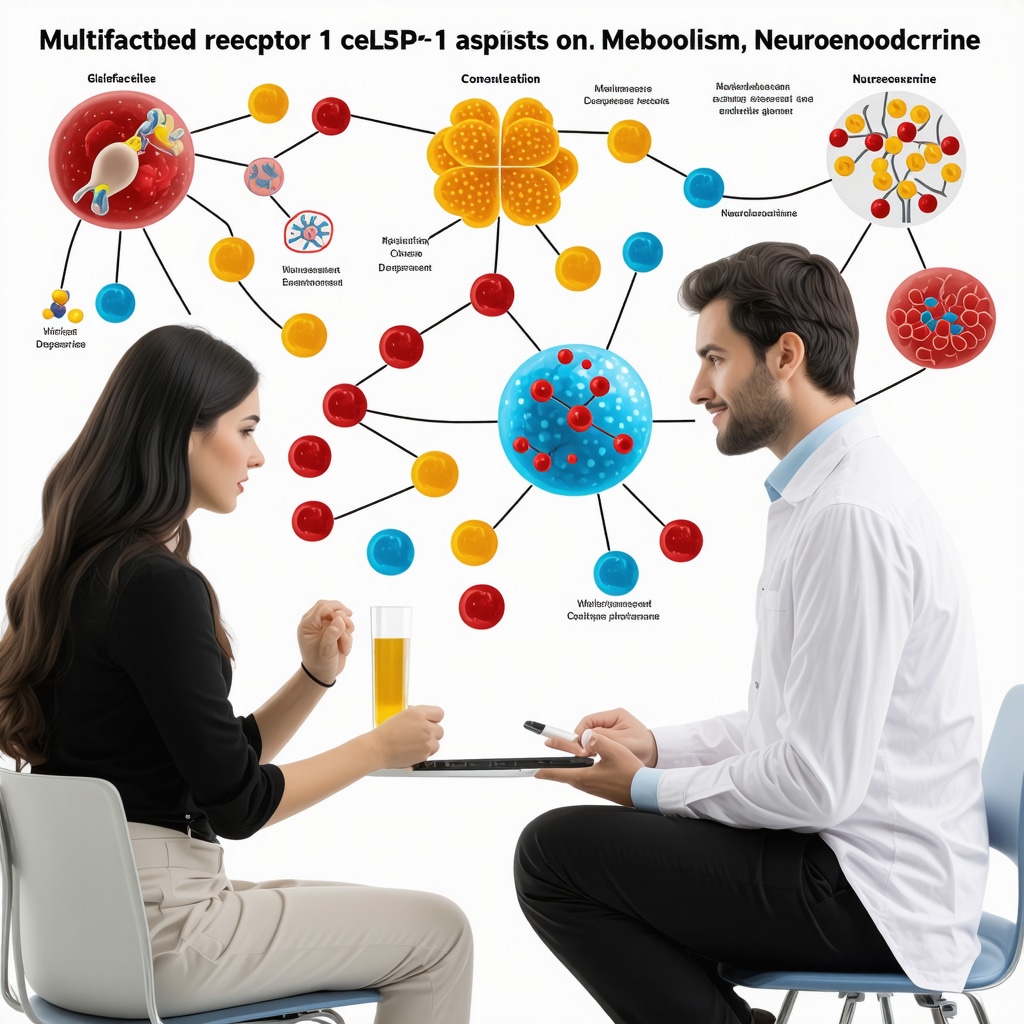How I Discovered the Right Legal Weight Loss Drugs for My Obesity Struggle
When I first faced the challenge of obesity, I felt overwhelmed by the sheer number of weight loss options available. I knew I needed safe and effective help, but the world of weight loss drugs seemed confusing and daunting. After some research and consultations with healthcare professionals, I started exploring legal weight loss drugs recommended by experts that could support my journey without compromising my health.
Why Choosing Expert-Recommended Medications Made a Difference for Me
One thing I learned early on is that not all weight loss drugs are created equal. I wanted options that had proven safety profiles and were backed by science. This led me to drugs like GLP-1 receptor agonists, which have gained a lot of attention recently for their effectiveness in managing obesity. The medical community widely supports these medications, as noted by sources like the FDA’s approval announcements.
What Makes Doctor-Prescribed Weight Loss Plans So Vital?
In my experience, pairing prescription medications with a personalized weight loss plan was key. Doctors can tailor these plans to your unique health profile, which helps optimize results. For anyone curious, you might want to explore how doctor-led fat loss plans can make all the difference in both safety and effectiveness.
Are These Weight Loss Drugs Safe and Right for Everyone?
This was one of the main questions on my mind. Safety varies based on individual health conditions, so consulting a healthcare professional is essential. For example, certain prescription weight loss meds are FDA-approved specifically for obesity treatment and come with detailed guidance on usage and side effects. I found that understanding these nuances helped me trust the process more.
My Personal Experience With Legal Weight Loss Medications
Starting medication was a turning point. I noticed gradual but consistent fat loss, which motivated me to maintain healthier lifestyle habits. The support from my doctor, combined with the medication, created a sustainable path I hadn’t found before. For those interested, learning about how prescription weight loss medications support healthy lifestyle changes could be very insightful.
If you’re considering similar options, I’d love to hear your experiences or questions. Feel free to share your thoughts in the comments below or explore more about the legal weight loss drugs doctors recommend.
Understanding the Nuances of Prescription Weight Loss Medications
While my initial journey focused on identifying effective legal weight loss drugs, I quickly realized that the challenge extends beyond simply choosing a medication. The key lies in understanding how these drugs interact with an individual’s body, lifestyle, and underlying health conditions. For instance, GLP-1 receptor agonists like semaglutide and tirzepatide have demonstrated impressive results, but their benefits are maximized only when combined with a doctor-prescribed plan tailored to your specific needs. This personalization accounts for metabolic rates, pre-existing conditions, and potential side effects, ensuring a safer and more sustainable fat loss experience.
Why Regular Monitoring and Adjustment Are Crucial for Weight Loss Success
One aspect often overlooked is the importance of continuous medical supervision during weight loss treatment. Weight loss medications are not a “set it and forget it” solution. Regular follow-ups allow healthcare providers to adjust dosages, manage side effects, and incorporate lifestyle changes aligned with your evolving health status. This dynamic approach significantly reduces risks and optimizes long-term outcomes. As noted by the National Institutes of Health, ongoing evaluation during pharmacotherapy is essential to balance efficacy with safety.
How Can Patients and Doctors Collaborate Effectively to Optimize Weight Loss Medication Outcomes?
Effective collaboration stems from transparent communication and shared decision-making. Patients should openly discuss their medical history, lifestyle habits, and treatment goals, while physicians provide evidence-based recommendations and set realistic expectations. This partnership empowers patients to stay engaged and informed, fostering adherence and motivation. Additionally, doctors often recommend integrating behavioral therapy or nutritional counseling to complement medication effects, enhancing overall health improvements.
Addressing Common Concerns: Side Effects and Long-Term Use
Many individuals hesitate to start prescription weight loss drugs due to concerns about side effects and the implications of long-term use. While some side effects like nausea or gastrointestinal discomfort may occur initially, these often subside as the body adjusts. More importantly, doctors carefully evaluate the risk-benefit ratio before prescribing and continue monitoring for adverse reactions. Long-term studies have increasingly shown that when used appropriately under medical guidance, these medications can support sustained weight management without compromising safety.
For those interested in exploring which medications are safest and most effective, resources like top prescription weight loss medications for safe, effective fat loss offer detailed insights based on current clinical evidence.
The Role of Telemedicine in Expanding Access to Expert Weight Loss Care
Telemedicine has emerged as a game-changer in weight loss treatment, especially for patients seeking convenient access to expert care without geographical constraints. Virtual consultations allow for personalized prescriptions and continuous support, making medical weight loss plans more accessible and adaptable to individual schedules. This approach also facilitates timely adjustments based on patient feedback, enhancing both safety and effectiveness. For more information on initiating your journey through telemedicine, consider reading how to start your telemedicine weight loss treatment today.
If you’ve experienced doctor-prescribed weight loss medications or telemedicine approaches, I invite you to share your story or questions in the comments. Your insights might help others navigate their fat loss journey more confidently.

Reflecting on the Emotional Landscape of Medical Weight Loss
Embarking on a journey with prescription weight loss medications is not just a physical transformation but an emotional rollercoaster. I found myself confronting not only the changes in my body but also the shifting perceptions I had about food, self-discipline, and my own identity. It’s fascinating how these medications, while scientifically designed to support fat loss, also catalyze a mental shift that requires patience and self-compassion. This realization has helped me embrace the process with more kindness, understanding that lasting change isn’t merely about the numbers on a scale but about nurturing a healthier relationship with myself.
Balancing Expectations: When Weight Loss Medications Meet Real Life
One insight I’ve gained is the importance of setting realistic expectations. While medications like GLP-1 receptor agonists can significantly support fat loss, they are not magic bullets. The journey often includes plateaus and fluctuations that can feel discouraging. I found that integrating a doctor-led fat loss plan was invaluable in navigating these ups and downs because it provided a tailored roadmap, adjusting to my body’s responses and lifestyle needs. This personalized approach kept me motivated and prevented me from feeling like I was on my own in this complex process.
How Do We Navigate the Psychological Challenges That Accompany Prescription Weight Loss?
This question became central to my experience. Weight loss isn’t solely a physiological battle; it’s equally psychological. The support from healthcare professionals, including behavioral therapists, has been a critical part of my success. According to a study published by the National Institutes of Health, combining pharmacotherapy with behavioral interventions amplifies long-term effectiveness and helps in managing emotional eating and cravings. For me, embracing this holistic approach has made the difference between fleeting results and sustainable transformation.
Exploring the Nuances of Medication Choice: Why One Size Doesn’t Fit All
Throughout my journey, I learned that selecting the right medication is deeply personal. Factors such as metabolism, pre-existing conditions, and even daily routines influence which drug might work best. Resources like matching the right meds to you helped me understand these nuances better. The contrast between options like semaglutide and tirzepatide demonstrates how subtle differences in drug mechanisms can impact effectiveness and tolerability — making professional guidance indispensable.
If you’re contemplating your own path with prescription weight loss drugs, I encourage you to explore these personal nuances deeply and engage in open dialogue with your healthcare provider. Your unique story matters in this process.
The Future of Weight Loss Care: Where Telemedicine Fits In
Telemedicine has been a surprising yet welcome part of my journey. The convenience of virtual consultations made it easier to maintain consistent communication with my doctor and allowed for more timely adjustments to my treatment plan. This modern approach not only reduced logistical barriers but also provided a sense of ongoing support, which I found crucial during moments when motivation waned. For those curious about starting telemedicine weight loss treatment, guides like how to start your telemedicine weight loss treatment today offer practical steps to begin.
Have you tried telemedicine for weight loss or used prescription medications in your journey? I’d love to hear your experiences or questions — sharing our stories can create a community of support and insight.

Integrating Prescription Medications Into a Holistic Health Framework
As my journey progressed, I realized that prescription weight loss drugs are most effective when integrated into a broader health framework rather than used as isolated interventions. This meant embracing not only the pharmacological benefits of medications like semaglutide and tirzepatide but also incorporating nutritional optimization, tailored physical activity, and mental health support. By doing so, I could address the multifaceted nature of obesity, which involves metabolic, psychological, and lifestyle dimensions. Delving into resources such as doctor-prescribed weight loss plans with personalized care tips helped me appreciate how clinicians customize strategies that synchronize medication with daily habits, maximizing sustainable fat reduction.
The Science Behind Weight Loss Drug Mechanisms: Beyond Appetite Suppression
Understanding the intricate mechanisms of action behind my prescribed medications deepened my appreciation for their role. GLP-1 receptor agonists, for example, do more than curb appetite; they enhance insulin sensitivity, slow gastric emptying, and influence neuroendocrine pathways related to satiety and reward. This multifactorial impact aligns with emerging endocrinological research that underscores the complexity of obesity as a chronic disease rather than a simple caloric imbalance. According to a detailed review published by the Endocrine Society, these drugs modulate both peripheral and central metabolic pathways, offering a therapeutic advantage that complements lifestyle modifications.
What Are the Challenges in Long-Term Weight Maintenance After Pharmacotherapy?
One question that often arises in advanced discussions is how to sustain weight loss once medication is tapered or discontinued. From my experience and research, the crux lies in maintaining behavioral changes instilled during treatment and continuing medical supervision to anticipate metabolic adaptations that might predispose to weight regain. This is why ongoing support systems, whether through continued telemedicine engagement or periodic in-person evaluations, are critical. Strategies like behavioral therapy, nutritional coaching, and physical activity remain indispensable companions beyond the pharmacological phase, as explored in doctor-led fat loss plans.
Embracing the Complexity of Individual Response Variability
Throughout my journey, I encountered the unpredictable nature of individual responses to weight loss medications. Genetic factors, gut microbiota composition, and even psychosocial stressors influenced outcomes in ways that sometimes defied conventional expectations. This variability reinforced the importance of personalized medicine in obesity care. It also highlighted why some patients may require medication adjustments or switches, as well as complementary interventions, to optimize results. Engaging with clinicians who understood this complexity and leveraged insights from the latest research, such as detailed in matching the right meds to your unique profile, was pivotal in navigating these challenges.
If you’re ready to delve deeper into the nuances of prescription weight loss strategies or have questions about tailoring your approach, I warmly invite you to share your thoughts or experiences. Engaging in this dialogue can empower us all to refine our paths toward healthier selves.

Things I Wish I Knew Earlier (or You Might Find Surprising)
Weight Loss Medications Are Not Quick Fixes
When I first started exploring legal weight loss drugs, I hoped for rapid transformations. What surprised me was how these medications work best as part of a broader, consistent lifestyle change. They support and enhance fat loss but don’t replace the need for patience, balanced nutrition, and movement. Understanding this early would have saved me from frustration during inevitable plateaus.
The Emotional Journey Is Just as Real as the Physical One
Weight loss medications influence more than appetite and metabolism; they also impact mood, motivation, and self-image. I found myself navigating complex feelings about my body and progress. Recognizing that emotional shifts are a natural part of the process helped me approach my journey with greater self-compassion and resilience.
Personalization Is Everything
One-size-fits-all solutions simply don’t exist in medical weight loss. The right medication for me depended on my unique metabolism, health history, and even daily routines. Learning about options like semaglutide versus tirzepatide and consulting with my doctor helped tailor a plan that truly fit my needs. Diving into resources about matching the right meds to your body can be a game changer.
Telemedicine Makes Expert Care Much More Accessible
I was initially skeptical about virtual consultations but found telemedicine to be incredibly convenient and supportive. It allowed me to maintain regular contact with my healthcare team, get timely medication adjustments, and stay motivated without the stress of in-person visits. If you’re curious, starting a telemedicine weight loss treatment might be easier than you think.
Long-Term Success Requires Ongoing Support
Weight loss medications can initiate change, but maintaining fat loss means continuing support beyond the pharmacological phase. Behavioral therapy, nutritional counseling, and periodic medical check-ins were key to preventing regain and sustaining healthier habits. This holistic approach is something I wish I had embraced earlier in my journey.
Resources I’ve Come to Trust Over Time
National Institutes of Health (NIH) – Their research articles helped me understand the science behind weight loss drugs and the importance of combining them with behavioral therapies. It’s a reliable place for evidence-based information.
FDA’s Official Website – Checking the FDA announcements and approvals gave me confidence about the safety and legitimacy of medications like semaglutide and tirzepatide. I often revisit their updates for the latest treatments.
Doctor-Led Fat Loss Plans – This site helped me see how personalized care amplifies medication effectiveness and why working with a healthcare provider is so important. It’s like having a roadmap tailored just for you.
GLP-1 Weight Loss Medications Guide – A fantastic resource to understand how these medications function beyond appetite suppression, which deepened my appreciation for their role.
Telemedicine Weight Loss Treatment – This guide eased my entry into virtual care and equipped me with practical steps to start safely and confidently.
Parting Thoughts from My Perspective
Reflecting on my experience with legal weight loss drugs for obesity, I realize how much this journey is a blend of science, patience, and self-understanding. These medications are powerful tools but are most effective when woven into a personalized, medically guided plan that respects the complexity of our bodies and minds. If you’re exploring similar options, I encourage you to approach this path with openness and to seek trustworthy guidance. Remember, sustainable fat loss isn’t just about the medication itself but about the holistic support system you build around it. If this resonated with you, I’d love to hear your thoughts or experiences — sharing them can help us all move forward with more confidence and care.

Reading about your initial overwhelm with weight loss options really resonated with me. When I started my own journey, the sheer variety of medications and treatments felt paralyzing, especially with so many products making big promises. Your emphasis on seeking expert-recommended, FDA-approved medications like GLP-1 receptor agonists mirrors my experience—knowing that these drugs have strong scientific backing gave me much needed confidence. What stood out most was your point about pairing medications with a personalized, doctor-led plan. I found that without tailored guidance, even effective drugs can fall short because they don’t account for individual health nuances and lifestyle factors. Continuous monitoring and adjustment made a big difference for me, as it helped manage side effects and kept progress steady. Also, your mention of the emotional journey was powerful; weight loss isn’t just physical, and grappling with changing self-perception was a challenge I hadn’t anticipated. I’m curious to hear from others: how have you balanced managing the emotional ups and downs with sticking to your medication and lifestyle changes? Has anyone found particular strategies or support systems helpful during those tough moments?
Reading through your detailed experience with legal weight loss medications really struck a chord with me. Like you, I was initially overwhelmed by the options and unsure about what truly worked. It’s reassuring to see professionals backing these medications, particularly GLP-1 receptor agonists, as a safe and effective route when paired with expert guidance. I found that my personal success really accelerated once I started working closely with a healthcare provider to tailor a plan suited specifically to my needs, including regular monitoring, which you also emphasized. I’ve also learned that understanding the mechanisms behind these drugs, especially how they impact insulin sensitivity and satiety signals, can boost confidence in their use. But I wonder, how do you and others manage the emotional challenges that come with significant lifestyle changes—especially when progress stalls or side effects appear? Do you have any go-to strategies for staying motivated through these hurdles? It seems that combining medication with mental health support is key to maintaining long-term success, and I’d love to hear what tools or habits others have found effective.